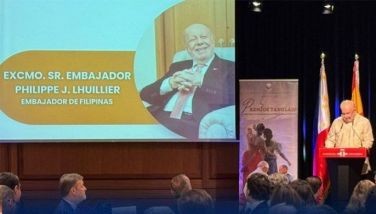Better opportunities for OFWs

I recently watched the movie “Triangle of Sadness” – a satirical comedy about a luxury cruise ship that sinks, leaving its billionaire passengers and some crew members stranded on an island. The film is allegorical of the social hierarchy that also exists in the ship. The wealthy passengers on top of the triangle stay on top of the yacht, the guest services staff in the middle and the workers at the very bottom. Like any other cruise ship, there are Filipino seafarers aboard the movie’s luxury yacht and they do the hard manual labor.
The film reminded me of the power asymmetries between overseas Filipino workers (OFWs) and their employers and the plight of Filipino seafarers, about 50,000 of whom stand to lose their jobs because of the Philippines’ repeated failure to comply with the requirements of the International Convention on the Standards on Training, Certification and Watchkeeping 1978 (STCW 1978), as amended.
As a signatory to the International Maritime Organization (IMO)’s STCW 1978, the Philippines must comply with the minimum requirements on training, certification and watchkeeping for seafarers. Between 2006 and 2020, the European Maritime Safety Agency (EMSA) has conducted eight inspections in the Philippines, including verification visits to check the implementation of corrective actions taken to comply with the STCW 1978. During its 2020 inspection, the EMSA noted 23 Findings under 6 Key Areas. The Philippines was then required to submit the actions we have done and plan to undertake in order to address the findings. So far we have failed to hurdle EMSA’s evaluation and this might cost thousands of Filipino seafarers their jobs.
It is unacceptable that skilled and hardworking Filipino seafarers who are known to be the best in the world might be unemployed because of a problem in the Philippines’ education, training and certification system that the government was not able to solve in the last 16 years. Although, I’m glad that President Marcos recognizes the urgency of the matter and has made it a priority to comply with the requirements of the STCW 1978. The government has prepared a “barrage of corrective actions on various levels” that would hopefully be able to produce a positive resolution within the next couple of months.
President Marcos has repeatedly vowed to address the concerns affecting our seafarers working in European vessels. During his travel to Brussels for the ASEAN-EU Commemorative Summit, he met with various leading shipowners all over Europe who committed to help the country meet these challenges. He also ordered the creation of an advisory board with government agencies, international shipowners and other stakeholders to address the concerns on the deployment of Filipino seafarers.
I believe that Filipino seafarers are among the best in the world because Filipinos are naturally hard working and very dedicated. This opinion is shared by shipowners who have repeatedly hired Filipinos that have made the Philippines the top provider of seafarers globally – for both officers and ratings across all departments, aboard merchant cargo vessels.
President Marcos would always express his pride and admiration for Filipinos living and working abroad and during his meetings with the Filipino community abroad, he thanks them for their hard work, dedication and for always leaving a good impression on the locals of their host country. OFWs also contribute significantly to our economy. Last year, personal remittances increased to a high of $34.88 billion, while cash remittances reached a new record of $31.42 billion. Filipino seafarers remitted a total of $6.54 billion from $6.353 billion in 2020, or an increase of 3 percent. OFW remittances contribute to the gross domestic product and have been significant in keeping the Philippine economy alive and in managing the country’s foreign exchange rate against volatilities.
Under its eight-point socioeconomic agenda, the Marcos administration aims to create more quality jobs by investing heavily in human capital development, infrastructure and the digital economy. In his trips abroad, the President meets with investors and businessmen to encourage them to invest in the Philippines that would create more employment opportunities. In fact, during his recent state visit to China, Chinese companies presented their investment plans in the Philippines, totaling $22.8 billion. Meanwhile in Brussels, where he participated in the ASEAN-EU Commemorative Summit last December, he secured P9.8 billion worth of investment pledges from different European companies. All of these mean more jobs and better opportunities for Filipinos.
Aside from creating job opportunities, the President also wants to increase employability of Filipinos through the continuous upgrading of skills and knowledge. In line with this, he ordered the reattachment of the Technical Education and Skills Development Authority (TESDA) to the Department of Labor and Employment (DOLE), which will result in stronger and better program coordination as part of the upgrading of technical and vocational education and training (TVET) systems.
The DOLE also initiated the calibration of skills, certification, professional standards and licensure examinations benchmarked with international standards. Moreover, to ensure that the skills of Filipino seafarers meet international competency and skills requirements, the DOLE continuously conducts trainings for seafarers under its Maritime Training and Skills Competency Program.
I feel and see the sincerity of President Marcos in finding ways to help not only our seafarers but all Filipinos living and working abroad who, he knows, have suffered enough. The government must and will take better care of them. Relevant government agencies have been tasked to ensure the protection of OFW welfare and provide better working conditions for them. At the same time, the President is doing his best to secure investments so that we have more jobs here in the country and our workers need not leave the Philippines in order to provide a better future for their families. There will also be improved opportunities for OFWs who would want to go back to the country for good.
OFWs make the tremendous sacrifice of leaving their families because they are forced by the lack of comparable employment opportunities in the Philippines. They mostly occupy blue collar jobs and the great asymmetry in the power balance between them and their employers has left many of them susceptible of being abused and exploited. I am glad that President Marcos is clear in his desire to help our OFWs and provide comparable employment opportunities in the Philippines, and that he has taken the initial steps to make this a reality. I look forward to seeing the fruits of his efforts in the coming years.
- Latest
- Trending























